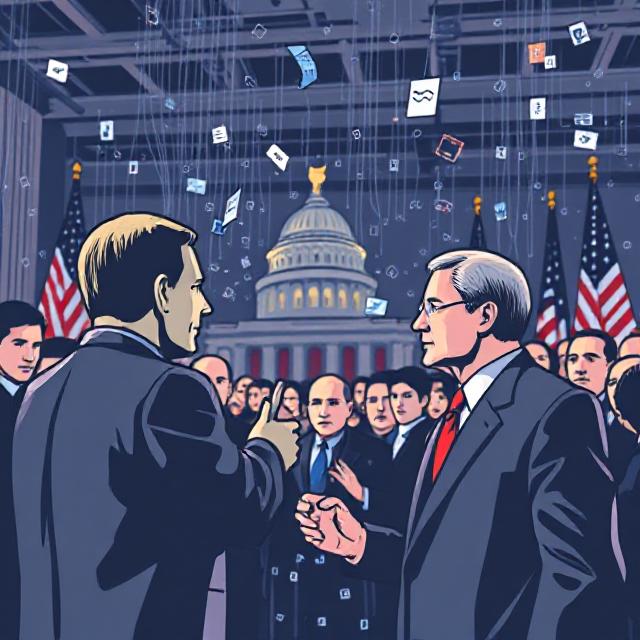Tech Elite: Silicon Valley’s DC Influence
How Silicon Valley’s Influence in Washington Benefits the Tech Elite Silicon Valley’s footprint in Washington has expanded notably, reshaping policy-making and regulatory landscapes to favor...
⏱️ Estimated reading time: 4 min
Latest News
How Silicon Valley’s Influence in Washington Benefits the Tech Elite
Silicon Valley’s footprint in Washington has expanded notably, reshaping policy-making and regulatory landscapes to favor the tech elite. This growing influence manifests through strategic appointments, substantial lobbying efforts, and significant political contributions.LinkedIn
🏛️ Strategic Appointments and Government Contracts
Since early 2025, over thirty individuals associated with tech magnates like Elon Musk, Peter Thiel, Marc Andreessen, and Palmer Luckey have secured influential positions within U.S. federal agencies. These appointments span offices that regulate and award contracts to their companies, raising concerns about potential conflicts of interest. Notably, firms linked to these figures have received over $6 billion in government contracts since President Trump’s inauguration, including SpaceX‘s $5.9 billion Pentagon contract and Anduril‘s $22 billion Army augmented reality deal. TechCrunch
💰 Lobbying and Political Contributions
Tech companies are investing heavily in lobbying to shape policies in their favor. For instance, Google alone spent $30 million in 2024 on lobbying efforts related to AI regulation, antitrust laws, and digital privacy—surpassing the entire U.S. steel industry’s lobbying expenditures. Additionally, super PACs like Fairshake have emerged, with messages such as: “If you are pro-crypto, we will help you, and if you are anti, we will tear you apart,” illustrating the aggressive tactics employed to influence policy. LinkedInThe New Yorker

⚖️ Regulatory Rollbacks and Oversight Concerns
The tech sector’s influence has led to regulatory changes that benefit their interests. For example, the Consumer Financial Protection Bureau retreated from pursuing rules that would restrict data brokers, despite growing privacy concerns—a shift favoring companies involved in AI, surveillance, and data analytics. Furthermore, staff reductions at agencies like the National Highway Traffic Safety Administration have impeded investigations into autonomous vehicle safety, including probes into Tesla. Bundle
🧠 Policy Shaping Through Think Tanks and Forums
Organizations like the Hill and Valley Forum have become platforms for tech leaders to influence national policy. This forum, initially a supper club for nationalist, anti-China tech executives, has evolved into a powerful force advocating for defense innovation, deregulation, and strategic investments in national security technology. Prominent figures such as Elon Musk and venture capitalist David Sacks have been appointed to high-profile roles in the Trump administration, highlighting the tech sector’s transition from lobbying outsiders to policy insiders. Business Insider
📉 Impact on Worker Activism and Ethical Oversight
Major tech companies have adopted a more aggressive stance toward employee activism and political dissent. Whereas in the past, worker campaigns led companies to revise contentious policies, today’s efforts are met with firings, internal censorship, and dismissal of petitions. This shift coincides with a harsher labor market, diminishing employee leverage and raising concerns about the suppression of internal dissent. The Washington Post
For a comprehensive analysis of Silicon Valley’s growing influence in Washington and its implications, refer to the detailed report by TechCrunch. TechCrunch
Lobbying Power and Policy Shaping
Tech giants invest heavily in lobbying efforts to influence legislation and regulatory decisions. These efforts focus on areas like antitrust, data privacy, and intellectual property. By engaging with policymakers, companies like Google and Meta can shape policies that align with their business interests. For example, Google’s lobbying expenditure is significant. This ensures their voice is heard during crucial policy debates.
Key Areas of Influence
- Antitrust Regulations: Lobbying to weaken or prevent stricter antitrust enforcement.
- Data Privacy Laws: Shaping data privacy laws to allow for greater data collection and usage.
- Intellectual Property: Protecting intellectual property rights while advocating for favorable copyright laws.

Financial Contributions and Political Campaigns
Beyond lobbying, financial contributions to political campaigns play a vital role. Tech executives and companies donate substantial amounts to candidates and political parties. These contributions can provide access and influence, ensuring that the tech industry’s concerns are addressed. These contributions help elect individuals who are sympathetic to the tech industry’s agenda, creating a favorable political environment.
Revolving Door Phenomenon
The “revolving door” phenomenon, where individuals move between government positions and the tech industry, further strengthens Silicon Valley’s influence. Former government officials bring their expertise and connections to tech companies, while tech executives bring their industry knowledge to government roles. This creates a network of individuals with shared interests, fostering collaboration and understanding between the two sectors. For example, someone might work at the FTC and then move to a tech company, or vice versa.
Public Perception and Narrative Control
Tech companies invest in public relations and communications to shape public perception. By controlling the narrative around their products and services, they can influence public opinion and policy decisions. Positive media coverage and strategic messaging can help create a favorable image, making it easier to advocate for their policy goals. These efforts ensure the public views the tech industry favorably, bolstering their position in Washington.
Related Posts
Bluesky Enhances Moderation for Transparency, Better Tracking
Bluesky Updates Moderation Policies for Enhanced Transparency Bluesky, the decentralized social network aiming to compete...
December 11, 2025

Google Maps: Gemini Tips, EV Charger Predictions & More!
Google Maps Gets Smarter: Gemini Tips & EV Updates Google Maps is enhancing user experience...
December 9, 2025

US, UK, Australia Sanction Russian Web Host
Crackdown on Russian ‘Bulletproof’ Web Host The United States, United Kingdom, and Australia have jointly...
December 6, 2025











Leave a Reply